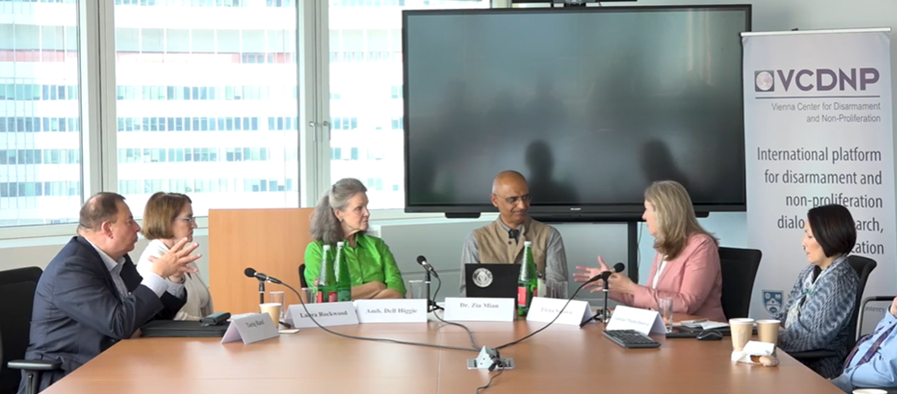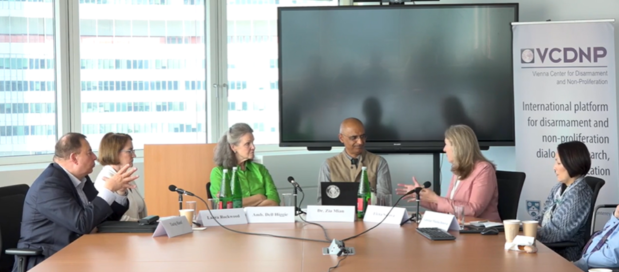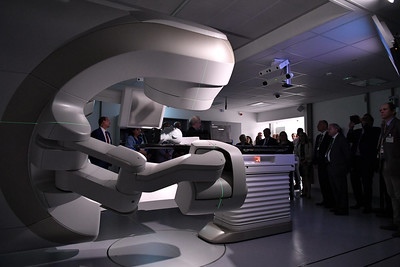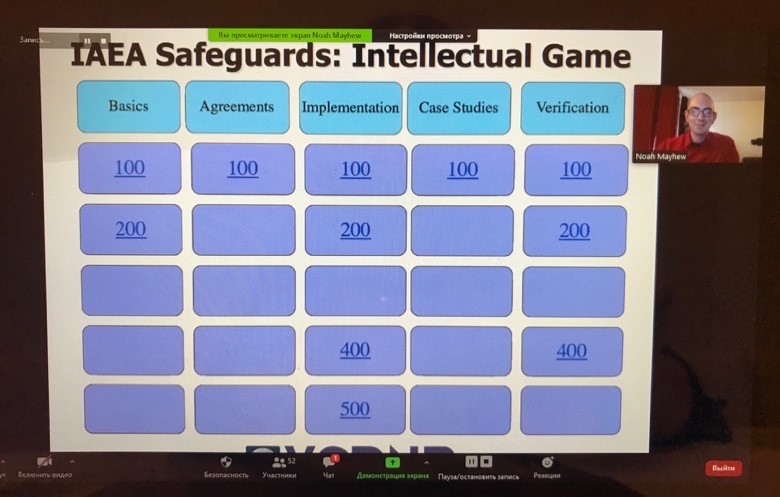
The Treaty on the Prohibition of Nuclear Weapons (TPNW) contains both negative and positive obligations: along with a comprehensive prohibition on nuclear weapons activities, it includes provisions for the elimination of nuclear weapons and obligations to provide for victim assistance and environmental remediation to mitigate the humanitarian impacts of nuclear weapon testing and use. The First Meeting of States parties to the TPNW also mandated the creation of a Scientific Advisory Group (SAG) to advise the States Parties and to engage with the scientific community on issues related to the Treaty and its aims.
On 30 May 2023, the VCDNP hosted a seminar to discuss the TPNW and its nexus with the Vienna-based international organisations. The speakers analysed the Treaty obligations, the work of the SAG, the technical and legal considerations of International Atomic Energy Agency’s (IAEA) involvement in the TPNW implementation, and the interface between the TPNW and other international bodies including the Preparatory Commission for the Comprehensive Test-Ban-Treaty Organization (CTBTO) and the UN Scientific Committee on the Effects of Atomic Radiation (UNSCEAR). Elena K. Sokova moderated the panel discussion.

Panellists:
Ambassador Higgie reviewed the TPNW provisions, particularly the obligations on States parties to eliminate their nuclear weapons programmes (Article 4.1-2) and provide victim assistance and States (Article 7) to address the consequences of nuclear weapons use and testing. Commenting on the lack of detail on the procedures for dismantlement of nuclear weapons and disarmament verification in the Treaty, she recalled the absence of nuclear-armed states at the TPNW negotiations and the resulting need to leave such specifics for future decisions.
Ambassador Higgie noted that obligations under Articles 6 and 7 explicitly recognise the consequences of nuclear weapons testing and use, making the TPNW the first treaty in the nuclear weapons space to adopt a humanitarian perspective. She also noted considerable interest from non-TPNW states in contributing to the humanitarian aspect of the TPNW implementation.
Dr Zia Mian spoke about the rationale for the creation of the Scientific Advisory Group, its mandate, composition and planned work. Convened for the first time in March 2023, the Group includes 15 members from 13 states, bringing a broad range of expertise to the table. Dr Mian noted that although SAG members are nominated by the TPNW States parties, they do not have to come from those countries, and some of the SAG experts are from non-TPNW states. The SAG can receive requests from the TPNW States parties to advise on specific questions but also maintains significant autonomy to consider wider scientific issues relevant for the Treaty implementation. The group has also been tasked with creating an international network of experts and institutions to support the advancement and implementation of the TPNW. Dr Mian underscored that the over-arching aim of the SAG was to foster active cooperative engagement between the scientific community, society, and affected communities in the context of the TPNW.
Tariq Rauf discussed how different aspects of the IAEA’s mandate are relevant for the TPNW implementation. He argued that the IAEA’s nuclear material verification mandate and technical expertise make it an appropriate body to be involved in verification of nuclear disarmament under the TPNW. He cautioned, though, about the limitations on the Agency’s ability to verify the process of dismantlement of nuclear warheads and delivery systems. Recalling the IAEA’s experience in South Africa, Iraq and Libya, Mr Rauf stressed that the Agency’s safeguards inspectors are not weapons inspectors. On the humanitarian provisions of the Treaty, he noted the relevance of the IAEA experience with environmental remediation in the South Pacific and Central Asian regions that are dealing with the legacy of nuclear weapons testing.

Laura Rockwood continued the discussion of how the IAEA’s mandate and expertise would be of relevance for the future verification under Article 4 of the TPNW. She examined in particular how, following the unilateral dismantlement of South Africa’s nuclear weapons programme, the IAEA verified that all nuclear material has been returned to civilian use. Ms. Rockwood also discussed the IAEA’s work on approaches to verification of fissile material with classified characteristics (taken out of weapons programmes) as part of the Trilateral Initiative with Russia and the United States. She underscored that a workable approach was developed, and the project stopped for political reasons rather than scientific or technical difficulties.
Highlighting the IAEA’s focus on nuclear material verification, Ms Rockwood also cautioned that requesting the Agency to verify the dismantlement of delivery systems would change the very complexion of the IAEA. With regard to Article 7, Ms Rockwood encouraged the SAG to take note of the IAEA’s Convention on Early Notification of a Nuclear Accident and Convention on Assistance in the Case of a Nuclear Accident or Radiological Emergency, which could inform the discussion surrounding international cooperation and assistance.
Gaukhar Mukhatzhanova discussed the link between the TPNW and the CTBT, noting that while both ban nuclear testing, on the former is in force and only the latter establishes a nuclear testing verification regime. In this regard, she argued that at future MSPs the TPNW States parties should consider more formally pledging their continued support for the CTBTO and its International Monitoring System. She further noted a potential for dialogue and cooperation between the SAG and CTBTO on capacity building and scientific research. Ms Mukhatzhanova also discussed the relevance of UNSCEAR, a body that has been producing scientific reports on radiation effects since the 1950s and is considered the foremost international authority on the subject. The work of UNSCEAR in examining the effects of nuclear testing on the environment and human health would be of particular importance to the SAG and the TPNW parties in discussions of nuclear weapons impact and victim assistance.
During the Q&A session, the panellists responded to a number of questions from the audience, including on the composition and funding of the SAG, the interaction with nuclear verification partnerships such as the QUAD, whether a new international organisation for the TPNW verification was a feasible option, and the level of confidence required in disarmament verification.
Watch the full recording here.





By continuing to use the site, you agree to the use of cookies. more information
The cookie settings on this website are set to "allow cookies" to give you the best browsing experience possible. If you continue to use this website without changing your cookie settings or you click "Accept" below then you are consenting to this.